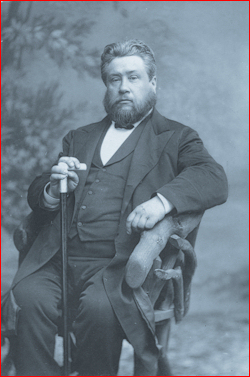by Dan Phillips
"Barring something extraordinary, odds are most people will end up in Heaven. Nothing to get worked up about."
Let's key off of
Mark Lussier's comment from the last post:
Of course we musn't forget about John 3:16 ;), Mark wrote. Indeed, not; so let's take a closer look: "For God so loved the world, that he gave his only Son, that whoever believes in him should not perish but have eternal life." So if "whoever
believes in" Jesus does "not perish, but [has] eternal life," what does that say about those who
do not believe in Jesus? Clearly, they
do perish, and they
do not have eternal life.
That, then, must be the default setting of man, according to the Gospel: bereft of eternal life, and headed surely for perdition. After all, no one is born believing in Jesus. To enter that state would require a change, a shift; it is a shift that is necessary for a change of destiny. Minus that change, the destiny is death and perdition. Something extraordinary must happen, to change our fate.
Exegetically it is difficult to tell whether John presents this verse as Jesus' words or his own thoughts. There is, however, no such question about Matthew 5-7, the famed Sermon on the Mount. In a recent post, we had a drive-by commenter give the Sermon a careless glance, and he pronounced it unremarkable. That's a bit like glancing up in a particular structure in Italy and pronouncing the ceiling of the Sistine Chapel "a bit busy."
Regardless, Jesus approaches a critical, confrontive, red-hot climax to His sermon with these words:
“Enter by the narrow gate. For the gate is wide and the way is easy that leads to destruction, and those who enter by it are many. For the gate is narrow and the way is hard that leads to life, and those who find it are few" (Matthew 7:13-14).
What is Jesus saying? He is saying that the easiest, broadest, and most popular way is that which leads to destruction. For that reason, it is the most well-traveled; "many" take that path.
By contrast, the path to life is narrow, it is a hard way, and those traveling by it are relatively "few." So something extraordinary must happen for one to get
off the majority's path, and
onto the minority's.
On another occasion, Jesus is asked, frontally and in so many words, "Lord, will those who are saved be few?” (Luke 13:23). Well, that set it right out, plain and blunt. How will He answer?
One thing we soon learn about our Lord is that He was not over-fond of gauzy, billowy theological yarning. Jesus shows no great affection for "what-if's" and "what-abouts." So here, rather than answering the question in detached terms, in effect He says "You are asking the wrong question. Standing here, in front of Me, you should not first be thinking about them, what they are going to do, and where they are going to go. You had better concern yourself with you. You strive to enter through the narrow door. For many, I tell you, will seek to enter and will not be able — and 'many' means you, unless something changes" (cf. Luke 13:24).
Jesus tells His questioner that he will have to "strive," he will have to focus and struggle and give effort — because "life" is not his default-setting. It is ordinary for him to miss the door. It would take something
extraordinary for him to find it.
It was similar with those who may have been getting out their what-if and how-about game pieces when a bunch of Galileans were killed by Pilate, and some others had a tower fall on them. Ooh, juicy stuff — what theological debates can we get into over
that?
None, Jesus responded; none, except one: "unless
you repent,
you will all likewise perish. ...unless
you repent,
you will all likewise perish” (cf. Luke 13:1-5). Two stories, one moral.
In fact, this takes us all the way back to Jesus' first recorded sermon in Matthew —
not the Sermon on the Mount, but this: "Repent, for the kingdom of heaven is at hand" (Matthew 4:17).
Repent, Jesus says.
Repent: plunge yourself into a fundamental paradigm shift towards God and the world. Something
extraordinary must happen in your heart and life. Change! Transform!
So we return to our opening thought. I daresay that most people would agree with what Jesus
didn't say. That is, most would agree that, barring something extraordinary, they're headed for Heaven. I mean, if they turned into some kind of Hitler or Dahmer or Pol Pot, then they'd be in peril. Otherwise? Relax. Don't sweat it. Nothing to get "
het up" about.
Don't you see, Jesus' thinking is the exact opposite? The
default setting of man is death and doom.
Unless something extraordinary happens — unless he repents, unless he finds the narrow door, unless he is miraculously
born again — he is heading towards the wrath of God
without a plea, a
hope,
or even a prayer.
Do the math, dear reader, as we head for the year's close. This means that
the odds are that you and I both are headed for damnation — barring something extraordinary. It is not that we must have an extraordinary reason to believe that someone (including ourselves!) is doomed; it is that we must have an extraordinary reason to believe that someone is saved.
The Gospel alone provides that reason, in and through and because of Christ alone..
This, in closing, is one thing that drives me a bit nuts about emerg*s, liberals, and academics. we already saw that Jesus was deadly-earnest about all this. Further, Jesus said,
I tell you, my friends, do not fear those who kill the body, and after that have nothing more that they can do. But I will warn you whom to fear: fear him who, after he has killed, has authority to cast into hell. Yes, I tell you, fear him!" (Luke 12:4-5).
Given what we've been looking at, that makes perfect sense. It makes sense of the generations and generations and generations of Christians who have died for their faith, embraced torture and death rather than renounce the faith, sometimes with songs of praise on their lips.
But emerg*s,
academics, liberals, tough-talking self-promoters? What would they die for? About what are they urgent? They play around with eternal truths, and eternal souls, as if it were all just a great gay game, just a grand faculty tea social. They give interviews to unbelievers, and write articles and present speeches and sermons, and spend the time whacking on Biblically-faithful Christians and puffing themselves up, leaving their hearers confirmed in their contempt for the Gospel.
It isn't like anything Jesus would say.
And I can't imagine He'd think much of it.


"What basis have I ever given you for doubting Me? I told you that I would be rejected, handed over to the chief priests and scribes, beaten, condemned, crucified, killed (Luke 9:22, 44; 18:31-33). You didn't believe that would happen, but it did. I also said I'd rise again from the dead (Luke 18:33). Did you disbelieve? Again? Why?"







 love the idea of unity built on a gospel foundation, but the success or failure of that idea hinges on our understanding of and commitment to a true, unadulterated, biblical understanding of the gospel. We know from both Scripture and the hard-fought lessons of church history that not everyone who says he is committed to the gospel really is. Not everyone who claims to stand with us in affirming gospel truth is really interested in doing the work of the Great Commission. Not everyone who signs an evangelical confession of faith actually preaches the gospel.
love the idea of unity built on a gospel foundation, but the success or failure of that idea hinges on our understanding of and commitment to a true, unadulterated, biblical understanding of the gospel. We know from both Scripture and the hard-fought lessons of church history that not everyone who says he is committed to the gospel really is. Not everyone who claims to stand with us in affirming gospel truth is really interested in doing the work of the Great Commission. Not everyone who signs an evangelical confession of faith actually preaches the gospel. But if we truly want any kind of gospel-based unity, we have to be willing to defend the gospel together. The gospel is not only the ground on which we unite with other believers, it is also ground we must earnestly defend against false teachers. You cannot achieve true unity unless you vigorously pursue both of those goals.
But if we truly want any kind of gospel-based unity, we have to be willing to defend the gospel together. The gospel is not only the ground on which we unite with other believers, it is also ground we must earnestly defend against false teachers. You cannot achieve true unity unless you vigorously pursue both of those goals.





 he music department at Grace Community Church used this white board to plan the order of service for each session of the Shepherds' Conference:
he music department at Grace Community Church used this white board to plan the order of service for each session of the Shepherds' Conference:
 ere's what the white board looked like after some anonymous miscreant (a seminary student enjoying Spring Break, perhaps) used it to reimagine what "The Shepherds' Conversation" might look like if we had been prone to follow the evangelical drift of the past couple of decades:
ere's what the white board looked like after some anonymous miscreant (a seminary student enjoying Spring Break, perhaps) used it to reimagine what "The Shepherds' Conversation" might look like if we had been prone to follow the evangelical drift of the past couple of decades:







 The
The  hen a man chooses a bad leader for his soul, at the end of all bad leadership there is a ditch.
hen a man chooses a bad leader for his soul, at the end of all bad leadership there is a ditch.

 ack in August of '08, I wrote
ack in August of '08, I wrote 
 McManus's current project is further removed from the proclamation of the gospel than anything you'll ever see from Osteen—and that's saying something. McManus is
McManus's current project is further removed from the proclamation of the gospel than anything you'll ever see from Osteen—and that's saying something. McManus is 
 hese are days of "modern thought;" as you are all aware men have become wondrously wise, and have outgrown the Scriptures. Certain unhappy children's heads are too big, and there is always a fear that it is not brain, but water on the brain; and this "modern thought" is simply a disease of wind on the brain, and likely to be a deadly one, if God does not cure the church of it.
hese are days of "modern thought;" as you are all aware men have become wondrously wise, and have outgrown the Scriptures. Certain unhappy children's heads are too big, and there is always a fear that it is not brain, but water on the brain; and this "modern thought" is simply a disease of wind on the brain, and likely to be a deadly one, if God does not cure the church of it.

 Well, there are 8 or 9 words in the book Kevin didn't address, and of course this is the pyro-centric part of the blogosphere so we have that flavor to add to Jim's book about why he's not Emergent. And after I'm done here, you folks will have your normal chance to say your piece.
Well, there are 8 or 9 words in the book Kevin didn't address, and of course this is the pyro-centric part of the blogosphere so we have that flavor to add to Jim's book about why he's not Emergent. And after I'm done here, you folks will have your normal chance to say your piece. So my summary here is not that you must read it to believe it: Jim's book about what he is describing as a "third way" between "emerging" and "traditional" is, in spite of itself, a book which will antagonize your complacency about the church in general and your church in particular. Because Jim obviously loves Christ, and therefore obviously loves his church, he wants others to do the same -- and it's refreshing to read a new book on this subject which isn't calling people to give up on leadership, gathering together, and serious views of worship but is also calling people to love, and serve, and commit because this is actually what Christ has called us to.
So my summary here is not that you must read it to believe it: Jim's book about what he is describing as a "third way" between "emerging" and "traditional" is, in spite of itself, a book which will antagonize your complacency about the church in general and your church in particular. Because Jim obviously loves Christ, and therefore obviously loves his church, he wants others to do the same -- and it's refreshing to read a new book on this subject which isn't calling people to give up on leadership, gathering together, and serious views of worship but is also calling people to love, and serve, and commit because this is actually what Christ has called us to.










